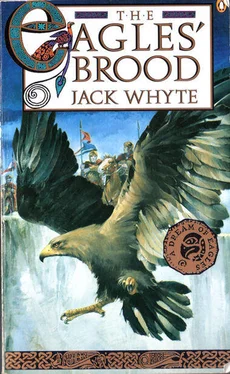My mind was screaming at me. Uther could have no idea, of course, who Ygraine truly was. He had killed her sister, bringing me after him, ravening for vengeance, and now when I found him he would be with yet another of this strange Erse family to which, it seemed, I was inextricably bound. I had a flashing image of Cassandra biting down on his swollen manhood and I felt my sanity withdrawing from me like a whirling wind. I pushed my fist, hard, into my mouth and bit down on my own knuckles. The sudden pain enabled me to regain control of my thoughts and force myself to remain rational. When I thought I had myself under control again I turned back to Popilius, clutching my bitten knuckles in my other hand. He was staring at me, wide-eyed, obviously wondering what my next reaction might be. I made myself walk back to him, and when I spoke, my voice sounded calm and reasonable even to me.
"When did this happen? What has happened? Tell me now, and leave nothing out."
One moment longer he hesitated, and then he began to speak in a flat, rough monotone. Much of what he would tell me, he was careful to point out at the start, was conjecture, but it was based solidly upon his own observations and upon comments made—or tactfully omitted—by other officers who were closer to the source of the truth than he was. In matters of fieldcraft, discipline, training, deployment and logistics, Uther consulted Popilius before committing himself or his forces to anything. Otherwise, Uther kept his own counsel and Popilius was normally content to have it that way. On this campaign, however, the veteran Popilius had been gravely troubled. His prime responsibility, as he saw it, was the defence and welfare of our Colony. If those twin priorities entailed a pre-emptive expedition into territories beyond our own, he would prosecute that campaign without question or pause, but his primary motivation was always to achieve the objective, deal with the threat and danger, and then withdraw homeward without delay. For more than a year now, he told me, that imperative had been neglected.
In the late summer of my first year of convalescence, Uther's advance party, with Uther himself in command, had surprised and captured a heavily escorted supply train on its way to the south coast, where the supplies were to be loaded onto ships and taken around by sea to Lot's stronghold on the northern coast of the long, Cornish peninsula. Among the personnel accompanying that train been a contingent of high-born ladies.
Uther, ever the dashing, dazzling heroic figure, had never warred on women and was at pains to point this out to his gentle prisoners. He had commiserated with them about the deaths of their escort and companions—the fortunes of war, over which he could have no control other than by ensuring victory for his own men. That done, and all courteously explained, he had entertained them lavishly as honoured guests for three days, during which his army had consolidated their own security and spirited the stolen spoils of the supply train into their own safe custody. Then, when he was sure that their reports could do nothing to hinder either his progress or his safety, he had released the women, sending them southward to their original destination under heavy guard.
No time had been lost on that occasion, Popilius assured me. Little had been risked, and a valuable prize had been gained. It was only months later that Popilius had begun to suspect that Uther himself had gained a valuable prize that day, quite apart from the captured supplies. Prior to that, Popilius had neither known nor cared about the identities of the women. He had found out only by accident one night, around the campfire with some of Uther's young staff officers who had drunk a little too much wine, that one of the women—the loveliest, of course—had been Lot's queen, Ygraine.
His soldier's mind had been outraged by this information, for here had been a legitimate spoil of war, a hostage and a bargaining tool of great power. Why, then, had Uther, who must have been well aware of who she was and what she would have been worth in the war against her husband, allowed the woman to go free? As I listened to his recounting of his misgivings, I was wondering the same thing myself. She was Lot's queen. She should never have been released!
Had she been anyone else, however, no matter who, Popilius's report would neither have bothered nor surprised me. I would have expected nothing less from my charming and mercurial cousin. But why in God's name would he have released Ygraine the queen? It made no sense at all, even had he been besotted by her, for merely by holding her prisoner he could have pursued his own designs and seduced her at his leisure, and with pleasure, knowing whose wife she was. And then it did make sense, in a bizarre, illogical way over which I had no control. The answer sprang into my mind completely formed and I accepted it immediately and instinctively as being true.
All that I knew of Lot, although I had not set eyes on him since that one time in boyhood, indicated that he was in many ways abnormal, almost inhuman, in his tastes and desires. Not that I had any cause to suspect him of being deviate or homosexual; far from it, his heterosexual lusts were notorious, as was his cruelty. It simply came to me that the man must be incapable of love—ordinary, human love—and it followed inevitably that his wife, as a bargaining piece in enemy hands, would have been less than useless to that enemy.
As a spy, however, angry in her Celtic pride and her sense of betrayal and abandonment by the man to whom she had been given like a sacrificial cow, she could be recruited to the cause of his enemies, would become an invaluable asset to them, even if her regal husband never shared a thought with her. From the way my heart swelled with excitement, I knew I was right. Ygraine was Uther's spy, the one of whom I had already heard! She and Uther had met, had quickly become enamoured of each other, and had conspired somehow, in the brief space of three short days, to undo Lot.
In the moments it took for all of this to explode in my mind, Popilius had continued speaking. Nothing had come of the events surrounding the supply train incident, he said, and apart from his outrage and puzzlement over the release of the woman, the whole thing had faded from his mind until about a year after the original encounter. Popilius had been personally inspecting the guards around a night camp when an exhausted rider had come in—a stranger wearing the blazon of the boar of Cornwall, Lot's own emblem— bearing urgent word for Uther.
Within the hour, Uther had ridden out, accompanied by only two of his closest circle, leaving his army under the control of Popilius. Nothing untoward had occurred and Popilius had not been unduly concerned at first. Only when the second consecutive day of Uther's absence dawned had Popilius begun to grow concerned. His concern mushroomed when he made specific inquiries and discovered that no one, including the remaining members of Uther's inner circle, knew where the king had gone. Even his Celts had no idea of Uther's whereabouts, but they at least were unconcerned. To them, their king was inviolable and invincible. He would come back safely.
As it transpired, Popilius had been forced to sit in agonized inactivity for two more days before Uther returned late in the afternoon, just before nightfall, galloping into camp as though he had not a care in the world. He had called a meeting of his senior officers immediately, and told them they would be moving out at dawn. Few slept for more than an hour that night, because long before dawn began to lighten the sky the camp had been broken down and stowed, and the troops were in formation, ready to ride out. They had marched for a day and a half, and then prepared an elaborate ambush above a narrow, mile-long gorge, where the only road ran narrow and serpentine alongside a fast-flowing stream. Every trooper had been turned to work lining the lip of the gorge with massive boulders, assembling an avalanche of rocks that would decimate the forces caught below. Uther's bowmen, in the meantime, were busy digging themselves in on the peat-covered hillsides on the exit side of the gorge, where the emerging road turned left to pass along the bottom of a gentle slope.
Читать дальше









